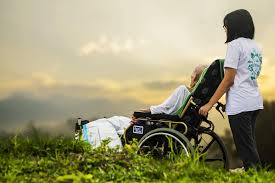All Those Invisible Heroes
Devra Torres | Sep 18, 2017
 When I thought my parents would be moving in with us, I joined a Facebook group for people caring for Alzheimers patients (like my mother). As it turned out, she had to move to a nursing home, but my father visits her twice a day (bearing fragrant, contraband fried dough from the farmers market, taking her out for ice cream, and consulting with the staff when there's trouble). I just pray from afar, and he keeps me posted. I don't really belong in the Facebook group after all.
When I thought my parents would be moving in with us, I joined a Facebook group for people caring for Alzheimers patients (like my mother). As it turned out, she had to move to a nursing home, but my father visits her twice a day (bearing fragrant, contraband fried dough from the farmers market, taking her out for ice cream, and consulting with the staff when there's trouble). I just pray from afar, and he keeps me posted. I don't really belong in the Facebook group after all.
But I linger on anyway. It opened my eyes to something I never considered before: the world is full of people giving up their jobs, homes, hobbies, friendships, social lives, vacations, and sometimes (involuntarily) marriages and relationships with extended family. Or they're putting these goods on hold indefinitely, maybe permanently, to take on the much-more-than-full-time job of caring for their relatives at home. Sometimes I learn something useful from the group--even though Alzheimers is one of those things for which there's no earthly "solution" at all. Or I devote a few seconds to writing words of encouragement to one of these brave, exhausted people. It's truly the least I can do.
But mostly I stay just to remind myself of this invisible cloud of witnesses who are up against things the rest of us have no idea of, and, worse, would just as soon never think about. A much-overused word applies here: "marginalization."
These "caregivers"--or maybe they should be called "life-givers"--get stuck with the messy details. You don't even want to know how messy. But it's not just that. They have to decipher the law, negotiate the finding and retaining of aides, respite care, hospice care, rehabilitation services, and some way to pay for it all. They have to decipher the laws about power of attorney and guardianship. They have to wrestle doctors, pharmacists, and insurance companies into submission, often with mother-of-a-newborn levels of sleep deprivation, but with none of the hope and optimism. They have to lift grown adults, call ambulances, research bed alarms and motion sensors and locks. They often get ignored or derided for not having a "real job" by the very relatives they turn to for help.
And then there are the end-of-life questions.
Most caregivers are not experts in medical ethics. Their ideas on philosophy and theology range anywhere from wise intuition born of long, hard experience to a fuzzy memory of something they read once in People magazine. They don't have the luxury of fooling themselves about the "quality of life" of somebody with rapidly worsening dementia, just maybe a vague sense of duty and reverence for life--and love of "the person someone used to be"--hampered by constant pressure to sign living wills and Do Not Resuscitate orders.*
I don't have a solution, but something I read recently in a collection of passages from Pope St. John Paul II (Words of Certitude) rang true. Sometimes we talk about "death with dignity" as if it's a question of physical circumstance at the very end of life. So maximum dignity, we imagine, is obtained when you have maximum control over those circumstances.
But listen to this:
Even if someone does not choose his own death, still, by choosing his own form of life, he, in a certain sense, chooses in this perspective even his own death.
The kind of death we choose has less to do with whether life leaves our body when it's in a distressingly embarrassing or messy or helpless state than with the kind of life we've lived. Somebody could die by euthanasia, quietly, in perfectly hygienic surroundings, but lack dignity, because of the things he valued and the choices he made before it came to that. Someone can die with a horrifying lack of (external) dignity but experience a noble death because of the way he lived while there was still time.
So how can we ensure that our own death will be dignified? We could start by offering to babysit a friend's elderly mother for an hour.
--------------------------------------
*I'm not saying DNR's are intrinsically evil, just that most people are never given the wherewithal to approach such decisions, and even if they are, the application of principles here can be horribly tricky and difficult.
